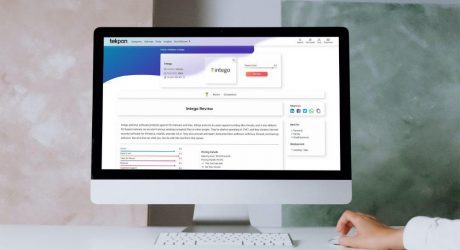The top concern for businesses is data security, and there is a significant desire for better data privacy procedures. As the pressure of data privacy regulations continues to increase, the need to increase the number of individuals working on compliance will eventually arise.
Without a team or at least one assistant, a single data protection officer or another role holder cannot manage, oversee, and manually apply data protection requirements.
Revolutionizing Business Security: The Future of Data Protection
Navigating the intricate digital landscape, where communications and transactions intertwine across global networks, the subtly integral role of offensive security emerges as a silent safeguard for our virtual engagements. Much like ancient merchants who fortified their caravans against potential threats on perilous journeys, today’s ethical hackers quietly and vigilantly shield our data as it traverses cyberspace’s expansive and often treacherous terrains.
In ensuring the blossoming digital economy remains a secure sphere for all undertakings, offensive security meticulously crafts a protective tapestry that, while frequently unseen, is vital for maintaining the integrity and confidentiality of our online exchanges. Delve deeper into the idea of continuous offensive security tools here.
What Is The Purpose Of Data Protection?
One of the storage options for data protection is disk or tape backup, which copies certain data to a disk-based storage array or a tape cartridge. A tape-based backup is a reliable choice for data security against attacks, as well as an offsite record storage service. Even though access to them could be delayed, tapes are protected from attacks over a network because they are portable and inherently offline when not connected to a drive.
Companies can make a copy of a website or data so that it is available from many places by mirroring. Every time a change is made, continuous data protection (CDP) creates a backup of all the data in a company. On the other hand, storage snapshots can automatically compile a list of pointers to the data kept on tape or disk, allowing for quicker data recovery.
Changes In Data Protection Roles
The current team of data protection employees puts in a lot of effort, which is commendable, but given the degree of security required, the number of these positions must be raised. One person cannot manage data, maintain its privacy, oversee the proper application of data privacy regulations, or manage data on their own.
As a team is required, it is necessary to segregate the data protection laws and establish a hierarchy in this area. This results in improved plans and policy implementation. The appropriate and qualified employees must be given responsibilities such as Chief Information Officer, Data Security Manager, and other titles.
Revolutionizing Business Security With Virtual Data Rooms
Every corporation must prioritize business security to safeguard confidential information, intellectual property, and financial resources from hackers, fraudsters, and other dangers. Enterprises can take the following steps to revolutionize company security:
● Use Multi-Factor Authentication:
This data protection security measurement requires individual users to provide two or more forms of identification before gaining access to sensitive information or systems. By using this strategy, the risk of unauthorized access can be significantly reduced, and it can be ensured that only authorized individuals have access to critical data.
● Use AI And Machine Learning:
AI and machine learning data protection algorithms can help organizations identify patterns and anomalies in data that may indicate a security threat. These technologies can also be used to automate threat detection and response, saving time and resources while improving the accuracy of security monitoring.
● Conduct Frequent Security Assessments:
Regular security assessments can help businesses identify weaknesses in their systems and processes and fix them before attackers exploit them. Penetration testing, vulnerability scanning, and risk evaluations are some examples of these evaluations.
● Implement Strong Password Policies:
Weak passwords are a significant security risk, as they are easy for attackers to guess or crack. Organizations should implement strong password policies requiring users to regularly create and change complex passwords to preserve their data protection.
● Use Encryption:
Encryption is a powerful data protection security tool that can protect sensitive data from unauthorized access. Organizations should implement encryption for data both in transit and at rest to ensure that even if a breach occurs, attackers will not be able to read the data.
By enabling prospective purchasers to view the data over a secure internet connection, virtual data rooms may streamline the due diligence process of an M&A sale or venture capital transaction.
Financial statements, client lists, contracts, product information, market research findings, and other business records are among the many papers related to the target organization that may be found in data rooms. Check more about M&A data rooms at virtualdata-rooms.com.
What Do You Need To Know About VRD For Business?
The sales process is no longer confined to the boardroom, and virtual data rooms (VDR) have transformed how firms and people do business. Sensitive data from businesses and organizations used to be stored in physical data rooms, which needed a specific area and had their limits.
VDR is a secure online database or storage space for this data type. Teams may use VDR to allow financial transactions between known and unknowable third parties, talk about personal information with possible investors, and more.
Although VDR is mostly a safety precaution to save private information in an online database, it may also be useful in some circumstances. Businesses may use virtual data rooms for nearly any transaction.
The following are some data protection tips which businesses employ VDR:
● Safeguarding Intellectual Property Rights.
Cyber risks are a regular occurrence for many businesses, especially SMEs. Cybersecurity is crucial for these companies. Due to routine internet use, enterprises are exposed to possible vulnerabilities that might affect their infrastructure or consumer data.
Cyber threats include malware assaults, rogue workers, insider threats, and others. Virtual data rooms provide an easy, safe, and affordable option for online intellectual property storage. They allow businesses to upload confidential information while protecting it from security breaches, thus lessening this issue.
● Auditing.
Data sharing with outside parties, including attorneys, accountants, compliance auditors, and other third parties, may be necessary for businesses. Companies must use encryption technology to safeguard sensitive data when sharing it with outside parties.
Data room services employ an encrypted server with virtual disks to safeguard corporate data privately. This way, data cannot be exposed to malicious attacks on the hosting platform or disclosed to outside parties.
With the use of VDR, businesses may share such data with third parties via an online database for evaluation while still keeping the data safe, secure, and free from any threat of tampering related to data protection.
● Mergers And Acquisitions.
A lot of information is involved in mergers and acquisitions. Third parties seek data rooms and digital data warehouses because they need the information to have a complete understanding of the organization.
These data protection solutions transform time-consuming, paper-intensive activities into simplified digital interactions that grow with your company.
● Board Members Collaboration.
Although it might be difficult to get in touch with them, board members and their advisers still need access to confidential corporate information. As the board members are frequently dispersed throughout different nations, especially worldwide, organizations need simple but safe access to such data.
Members who are often working remotely can easily evaluate material thanks to virtual data rooms.
● Fundraising.
Businesses that need to share sensitive information and protected text with investors or other stakeholders can benefit from virtual data rooms for data protection. They provide a secure environment for collaboration and the exchange of relevant documents tailored to the project’s requirements.
Conclusion
Companies looking to store sensitive information in an online database protected from security lapses and cyberattacks should consider using virtual data rooms. While security is crucial when using a VDR, accessibility, and file sharing become more straightforward and secure with virtual data rooms. There are various reasons why a company might choose to store data in virtual rooms, including responsible handling of fundraising, audits, mergers, and acquisitions.
The future of data protection is likely to be shaped by several factors, including technological advancements, regulatory changes, and increasing public awareness of data privacy issues. Governments worldwide are already enacting or revising data protection laws to ensure that individuals have more control over their data.
Read Also:




























